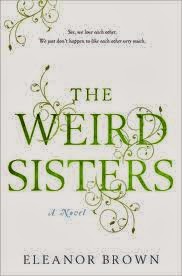Weird.
Can that be a sentence on its own? Well the book is weird, the
characters are weird, and the title reference to Macbeth is weird
because it lead me to think the sisters were going to be witches!
They were not witches, they were just “weird.” It is a beauty
though, nice iridescent white cover with beautiful and delicate green
vines meandering over the cover and through the title. There is also
a quotation on the front saying, “See, we love each other. We just
don't happen to like each other very much,” which is apropos
considering as the reader I didn't particularly like any of them
either. The first person plural narrative also gave me pause. At
first I kept thinking there must be a fourth person watching the
other three referring to “we” all the time, but then there was
only the three, therefore a collective first person. Recently I have
come across some other contemporary writers using that voice such as
Buddha in the Attic by
Otsuka but it isn't my favorite.
My
friend Wendy says I am weird because since high school, I have loved
Shakespeare. I tell her good teachers made it real to me and taught
me to appreciate Shakespearean references in contemporary media
whether it is in literature, television, or simply in everyday
references. This book is full of such references and quotations as
well although to ad nauseam sometimes. Three eccentric adult sisters
return home with the idea of ministering to their mother who is
suffering from breast cancer. Each is really escaping from her
failures and fears and is shocked to find her siblings also home.
They find themselves revisiting their relationships with each other,
dealing with their emotionally distant, renowned Shakespeare
scholar/college professor father who insists on answering questions
with rhymes, couplets, and quotations from plays, and figure out
where they want to go with their futures. All that while dealing with
a seriously ill mother and the eccentricities of their small college
town in rural Ohio.
The
sisters names are all from Shakespeare too and I am sure the author
chose them to compliment each personality. The oldest is Rosalind
named from “As You Like It” and is so controlling she cannot let
the others make decisions but also cannot move on with her fiance to
craft a new life on her own. Bianca from “The Taming of the Shrew”
is bossy, bitchy, over-sexed, deep in debt, and at a loss for how to
start over. Cordelia from “King Lear” has returned home after
years of drifting as a drugged hippie, pregnant, and facing 30 with
no skills or education.
The
plots fit together nicely actually. As the family progresses down the
path of surgery, chemotherapy, and rehab with the mother, the women
also grow, change, evolve, and move on. For me it was fun to fit in
the idea of a whole family who has lived for many decades with no TV,
with a penchant for books, and a love of a centuries-dead writer as
their compass. I liked it, but what I didn't like was the one
plot line of spinster-librarian bowing out and prodding the library
board to hire a non-librarian (Bianca) to fill her shoes, indicating
that being a librarian isn't rocket-science. What! Librarianship
isn't hard, you don't need a degree? Librarians beware when reading
this book. But “All's Well that Ends Well” (wink wink).

